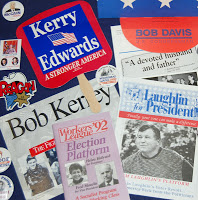 Now that November 6th has passed, Americans will stop keeping up with politics and continue Keeping up with the Kardashians. Yet, several of the most crucial elements of American democracy still warrant close attention, including voter identification laws, the restrictions on early voting and, not least of all, the newest phrase to have permeated American politics, that “corporations are people too”.
Now that November 6th has passed, Americans will stop keeping up with politics and continue Keeping up with the Kardashians. Yet, several of the most crucial elements of American democracy still warrant close attention, including voter identification laws, the restrictions on early voting and, not least of all, the newest phrase to have permeated American politics, that “corporations are people too”.
As the Report of the Global Commission on Elections, Democracy, and Security highlights, the integrity of elections depends at least in part on the regulation of “undisclosed and opaque political finance.” But even when we are able to create accountability through the disclosure of financing, we are faced with the larger issues about whose voices should be incorporated into the public sphere and how we might regulate the forms they take.
In October, US Senator John McCain described the Supreme Court’s Citizens United ruling as the bench’s “worst decision ever” — a difficult statement to disagree with, in my opinion.
In the divisive 5-to-4 decision, the Court’s ruling on Citizens United v. the Federal Elections Commission endorsed the view that the 2002 Bipartisan Campaign Reform Act restricted First Amendment rights. and in doing so the Court protected the use of unlimited amounts of money by corporations and unions into election campaigns.
As the American Civil Liberties Union puts it, “Some see corporations as artificial legal constructs that are not entitled to First Amendment rights. Others see corporations and unions as legitimate participants in public debate whose views can help educate voters as they form their opinions on candidates and issues.”
Moreover, the majority opinion asserted that the purpose and effect of the law privileged media corporations while restricting unions and other corporations from expressing facts and opinions regarding election campaigns. In an address to the conservative Federalist Society, Supreme Court Justice Samuel Alito defended his stance on the issue by arguing, “Surely the idea that the First Amendment protects only certain privileged voices should be disturbing to anybody who believes in free speech.”
Those of us concerned about blurring the distinction between media and other corporations may have been preemptively concerned about what ensued in the months prior to the election, when several large companies distributed voting information to their employees, even going so far as to recommend who to vote for and implying that their jobs might be at stake if they were to vote otherwise.
It is worth noting that the Court’s ruling did not address direct contributions to candidates. Still, we should not discount the significance of what Citizens United meant for independent expenditures, something that Justice John Paul Stevens argued comes close to direct contributions: “The difference between selling a vote and selling access is a matter of degree, not kind and selling access is not qualitatively different from giving special preference to those who spent money on one’s behalf.”
There are many that argue that the reaction to Citizens United is overstated and it is true that the decision did not begin nor will it end the discussion of the illegitimate marriage between money and politics. Still, the debates over Citizens United should remind us that we are working within the world of band-aid solutions. Even if Citizens United is overturned, a more comprehensive system of campaign finance reform would need to be instituted. In an ideal world, election campaigns would be financed publicly to ensure a fair playing field for candidates, super PACs would be no more and rules of disclosure would be closely monitored. Perhaps it’s a demanding and idealistic solution, but it would be a step toward preserving the integrity of elections and ensuring a deeper democracy in the United States.
Rhea Fernandes is an MPP student at the Blavatnik School of Government, Oxford.
This post is part of our Deepening Democracy series, responding to a September 2012 report by the Global Commission on Elections, Democracy and Security, on improving the integrity of elections. The series is being curated by the Blavatnik School of Government and hosted on Politics in Spires. It features contributions from students on the Master of Public Policy course at the Blavatnik School, as well as guest posts from Oxford and Cambridge scholars in politics and international relations.





No Comment